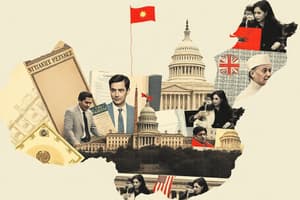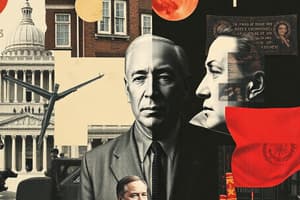Podcast
Questions and Answers
Which thinker is most closely associated with the idea that the state arises from a voluntary agreement between individuals to establish a sovereign power for the protection of their rights and security?
Which thinker is most closely associated with the idea that the state arises from a voluntary agreement between individuals to establish a sovereign power for the protection of their rights and security?
- John Locke (correct)
- Jean-Jacques Rousseau
- Thomas Hobbes (correct)
- Karl Marx
What is the primary function of the state according to the pluralist theory?
What is the primary function of the state according to the pluralist theory?
- To enforce the will of the majority, regardless of individual rights
- To defend the interests of the ruling class
- To promote the interests of the working class
- To act as a neutral referee between competing groups in society (correct)
In the context of external sovereignty, what does it mean for a country to be "free from foreign control of any kind"?
In the context of external sovereignty, what does it mean for a country to be "free from foreign control of any kind"?
- Having a strong military to deter foreign aggression
- Having the power to make independent decisions about its foreign policy and domestic affairs (correct)
- Having a strong legal system to protect its citizens from foreign interference
- Having a stable economy that can resist external pressures
How does the concept of international recognition relate to the concept of statehood?
How does the concept of international recognition relate to the concept of statehood?
According to the Marxist perspective, what is the primary function of the capitalist state?
According to the Marxist perspective, what is the primary function of the capitalist state?
What is the significance of the statement "Where there is no law there is no freedom" in the context of liberal theory?
What is the significance of the statement "Where there is no law there is no freedom" in the context of liberal theory?
How does the concept of a "social contract" relate to the origins of the state?
How does the concept of a "social contract" relate to the origins of the state?
Which of the following is NOT a characteristic of a minimal state?
Which of the following is NOT a characteristic of a minimal state?
Which of the following perspectives on state power aligns most closely with the concept of a minimal state?
Which of the following perspectives on state power aligns most closely with the concept of a minimal state?
The text suggests that feminists have challenged conventional understandings of the state by arguing that:
The text suggests that feminists have challenged conventional understandings of the state by arguing that:
According to the liberal perspective, what is the primary focus of citizenship?
According to the liberal perspective, what is the primary focus of citizenship?
What is the primary difference between liberal feminists and other feminist perspectives as described in the text?
What is the primary difference between liberal feminists and other feminist perspectives as described in the text?
Which of the following is NOT a key aspect of the liberal theory of citizenship?
Which of the following is NOT a key aspect of the liberal theory of citizenship?
The 'negative' view of the state held by classical liberals emphasizes which of the following?
The 'negative' view of the state held by classical liberals emphasizes which of the following?
How does the liberal perspective view the allocation of rights and duties to different groups within a society?
How does the liberal perspective view the allocation of rights and duties to different groups within a society?
The text suggests that the concept of a 'minimal state' is primarily intended to:
The text suggests that the concept of a 'minimal state' is primarily intended to:
Which of the following is NOT explicitly mentioned in the text as a defining feature of the minimal state?
Which of the following is NOT explicitly mentioned in the text as a defining feature of the minimal state?
Which thinker is credited as one of the founders of the liberal school of thought on citizenship?
Which thinker is credited as one of the founders of the liberal school of thought on citizenship?
According to Locke, what is the ultimate goal of individuals entering into society?
According to Locke, what is the ultimate goal of individuals entering into society?
The text suggests that the debate surrounding state power has been influenced by:
The text suggests that the debate surrounding state power has been influenced by:
In the liberal perspective, what kind of citizenship rights are considered most important?
In the liberal perspective, what kind of citizenship rights are considered most important?
What is the central point of contention between differing interpretations of state power?
What is the central point of contention between differing interpretations of state power?
The text emphasizes a divergence of opinions on state power between:
The text emphasizes a divergence of opinions on state power between:
Which of the following statements best reflects the liberal view of citizenship?
Which of the following statements best reflects the liberal view of citizenship?
What is the main difference between the liberal and other theories of citizenship?
What is the main difference between the liberal and other theories of citizenship?
How does the liberal theory of citizenship view the relationship between the individual and the state?
How does the liberal theory of citizenship view the relationship between the individual and the state?
What is the significance of property rights in the liberal theory of citizenship?
What is the significance of property rights in the liberal theory of citizenship?
Which of the following is NOT a potential benefit of a global governance framework in addressing contemporary global challenges, according to the provided text?
Which of the following is NOT a potential benefit of a global governance framework in addressing contemporary global challenges, according to the provided text?
What is the primary argument for cosmopolitanism in addressing global challenges?
What is the primary argument for cosmopolitanism in addressing global challenges?
Which of the following scenarios best exemplifies jus soli as described in the text?
Which of the following scenarios best exemplifies jus soli as described in the text?
What is the main distinction between jus soli and jus sanguinis in acquiring citizenship?
What is the main distinction between jus soli and jus sanguinis in acquiring citizenship?
Based on the text, which of the following practices falls under the concept of naturalization?
Based on the text, which of the following practices falls under the concept of naturalization?
What is the main argument of the 'Leviathan State' perspective?
What is the main argument of the 'Leviathan State' perspective?
Which of the following characteristics best defines the 'New Right' perspective on the state?
Which of the following characteristics best defines the 'New Right' perspective on the state?
How does the Marxist perspective differ from the 'Leviathan State' perspective on the state's role?
How does the Marxist perspective differ from the 'Leviathan State' perspective on the state's role?
According to Marxist theory, how can the state be used constructively?
According to Marxist theory, how can the state be used constructively?
Which of these perspectives suggests that the state's growth is primarily driven by internal pressures?
Which of these perspectives suggests that the state's growth is primarily driven by internal pressures?
Which of the following is NOT a feature of the 'Leviathan State' perspective?
Which of the following is NOT a feature of the 'Leviathan State' perspective?
What is the central difference between the Marxist and the 'Leviathan State' perspectives on the state?
What is the central difference between the Marxist and the 'Leviathan State' perspectives on the state?
According to the 'Leviathan State' perspective, why does the state expand?
According to the 'Leviathan State' perspective, why does the state expand?
How does the 'Leviathan State' perspective differ from the pluralist view of the state?
How does the 'Leviathan State' perspective differ from the pluralist view of the state?
Flashcards
Marxist View on State
Marxist View on State
The belief that the state reflects the economic class system and is an instrument of class oppression.
Revolutionary Dictatorship
Revolutionary Dictatorship
A concept in Marxism where the proletariat takes control of the state to transition to communism.
Leviathan State
Leviathan State
The idea of the state as a self-serving entity seeking to expand its power.
New Right Perspective
New Right Perspective
Signup and view all the flashcards
Demand-side Pressures
Demand-side Pressures
Signup and view all the flashcards
Supply-side Pressures
Supply-side Pressures
Signup and view all the flashcards
Patriarchal State
Patriarchal State
Signup and view all the flashcards
Class Oppression
Class Oppression
Signup and view all the flashcards
Pluralism vs. New Right
Pluralism vs. New Right
Signup and view all the flashcards
External Sovereignty
External Sovereignty
Signup and view all the flashcards
Recognition
Recognition
Signup and view all the flashcards
Pluralist State
Pluralist State
Signup and view all the flashcards
Social Contract
Social Contract
Signup and view all the flashcards
Liberal Theory
Liberal Theory
Signup and view all the flashcards
Marxist Notion of Capitalist State
Marxist Notion of Capitalist State
Signup and view all the flashcards
Political Obligation
Political Obligation
Signup and view all the flashcards
Transnational Citizenship
Transnational Citizenship
Signup and view all the flashcards
Cosmopolitanism
Cosmopolitanism
Signup and view all the flashcards
Jus Soli
Jus Soli
Signup and view all the flashcards
Jus Sanguinis
Jus Sanguinis
Signup and view all the flashcards
Naturalization
Naturalization
Signup and view all the flashcards
Feminist Perspectives on State Power
Feminist Perspectives on State Power
Signup and view all the flashcards
Liberal Feminism
Liberal Feminism
Signup and view all the flashcards
State Bias
State Bias
Signup and view all the flashcards
Minimal State
Minimal State
Signup and view all the flashcards
Social-Contract Theory
Social-Contract Theory
Signup and view all the flashcards
Negative View of the State
Negative View of the State
Signup and view all the flashcards
Core Function of the Minimal State
Core Function of the Minimal State
Signup and view all the flashcards
Protection of Rights
Protection of Rights
Signup and view all the flashcards
Institutional Apparatus of a Minimal State
Institutional Apparatus of a Minimal State
Signup and view all the flashcards
Implications of State Roles
Implications of State Roles
Signup and view all the flashcards
Citizenship
Citizenship
Signup and view all the flashcards
Stateless
Stateless
Signup and view all the flashcards
Liberal Theories
Liberal Theories
Signup and view all the flashcards
John Locke
John Locke
Signup and view all the flashcards
J.S. Mill
J.S. Mill
Signup and view all the flashcards
Rights and Duties
Rights and Duties
Signup and view all the flashcards
Equality Among Citizens
Equality Among Citizens
Signup and view all the flashcards
Discrimination in Citizenship
Discrimination in Citizenship
Signup and view all the flashcards
Civil and Political Rights
Civil and Political Rights
Signup and view all the flashcards
Common Good
Common Good
Signup and view all the flashcards
Study Notes
State, Government, and Citizenship
- A state is an institution that formalizes and organizes political dynamics.
- A state is characterized by five elements:
- Population: A human association within a defined area. No minimum population is required, though states can be as small as Vatican City or as large as China.
- Defined Territory: Internationally accepted geographical boundaries encompassing land, water, airspace, and natural resources.
- Government: The soul and brain of the state. It implements community will, maintains law and order, and makes a "good life" possible. It is the administrative wing of the state.
- Sovereignty: The supreme power over a people in a defined area, unrestrained by external laws, and free from direct external control. The state makes its own laws and has the ultimate authority within its territory.
- Recognition: Acknowledgment by the international community as a state with "international personality."
Rival Theories of State
- Pluralist State: A state acts as a neutral umpire among competing societal interests, acting in the common good of all citizens.
- This theory has its roots in social contract theories of thinkers like Hobbes and Locke.
- It views the state as a referee, protecting individual freedoms.
- Capitalist State: A Marxist view that argues the state is an instrument of class oppression, reflecting the class system.
- The state is not neutral but serves the interests of the ruling class.
- Leviathan State: A state as a powerful, self-serving entity focused on expansion and exceeding its bounds, rather than promoting general welfare.
- This is connected with neoliberal theories. States are believed to be parasitic and interfere in the economy and social lives excessively.
- Patriarchal State: Feminist theories highlight how the state often reflects the power structures of male dominance within society.
- Questions conventional views that the state is the sole arbiter of violence.
- Challenges how the state manages family and domestic issues.
The Role of the State
- Minimal State: Classical liberals favor the state with limited control. Its role is to ensure freedom and protect rights via the law.
- Developmental State: The state actively intervenes in the economy to promote growth and industrialization.
- Social Democratic State: An active participant in managing conflict, ensuring social harmony, and redistributing wealth.
- Collectivized State: The state controls all aspects of economic life and controls resources centrally.
- Totalitarian State: The most extreme form of intervention, encompassing all aspects of life under absolute state control.
- Religious State: A state grounded in religious principles, utilizing religion as a basis for political action and lawmaking.
Understanding Government
- Government encompasses the legislative, executive, and judicial bodies that make laws.
- Authority: The ability to compel obedience. Legitimacy arises when citizens willingly accept the authority of the government. It arises from recognition from the society.
- Legitimacy: A perceived rightfulness to rule. Authority that is accepted as valid and just. Without at least a measure of legitimacy, a government will likely fail.
Functions of Government
- Self-preservation (e.g., defense, law and order)
- Management of conflicts
- Regulation of the economy
- Protection of rights
- Provision of services
Citizens and Citizenship
- Citizen: A legally recognized member of a state.
- Citizenship: The legal status of belonging to a state, granting rights and responsibilities.
- Theories of Citizenship:
- Liberal: Citizenship emphasizes individual rights and freedoms.
- Republican: Citizenship emphasizes civic virtue and engagement in the common good.
- Transnational: Citizenship transcends national borders, recognizing multiple communities and affiliations.
Acquiring/Losing Citizenship
- Ways to acquire citizenship: birth, law, marriage, adoption.
- Ways to lose citizenship: renunciation, deprivation, lapse, etc.
Ethiopian Focus (where applicable)
- Note specific laws, historical context, and unique legal frameworks pertinent to Ethiopia. (e.g. the 2003 nationality proclamation, specific laws concerning loss of citizenship, etc.)
Studying That Suits You
Use AI to generate personalized quizzes and flashcards to suit your learning preferences.




